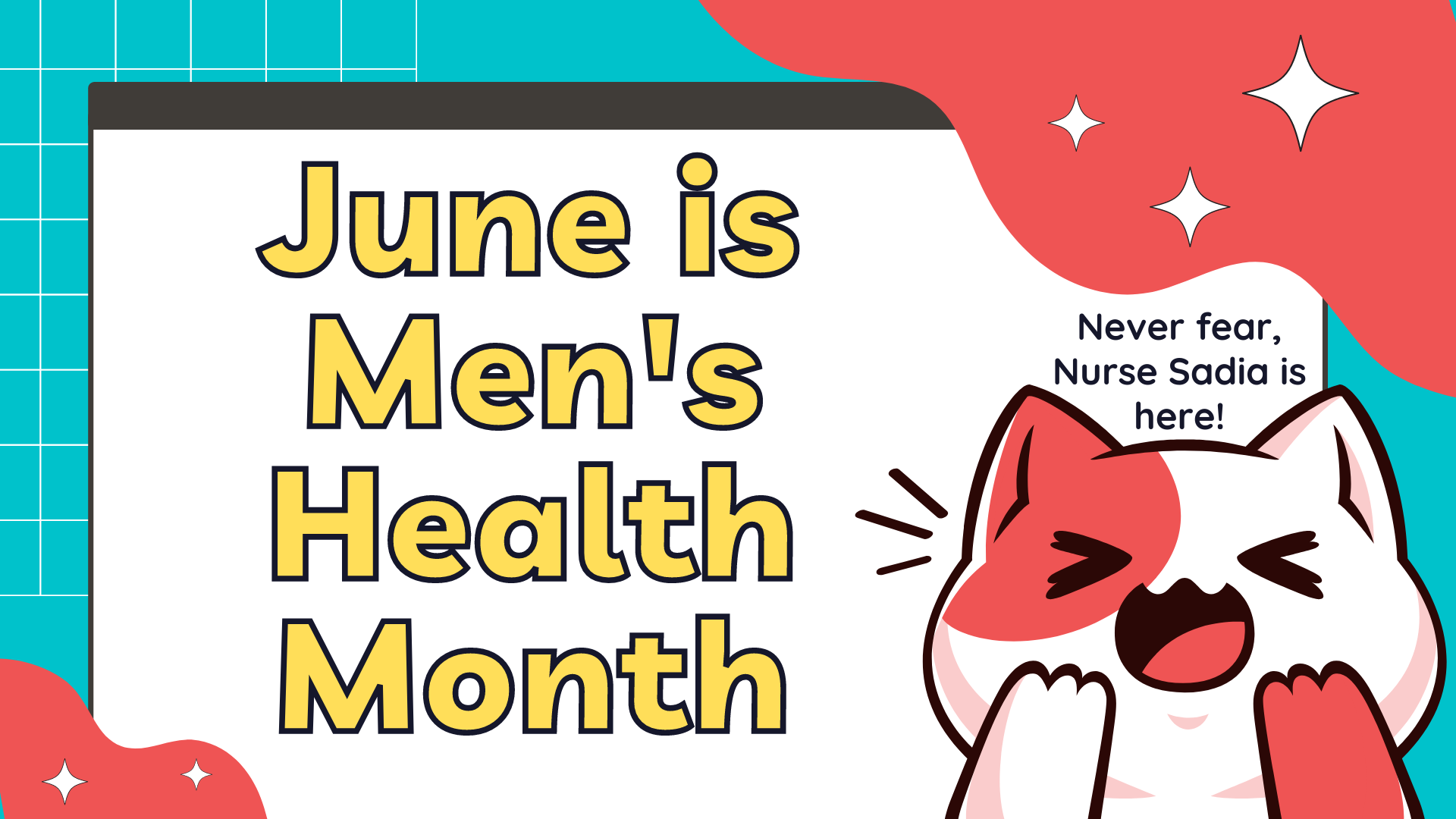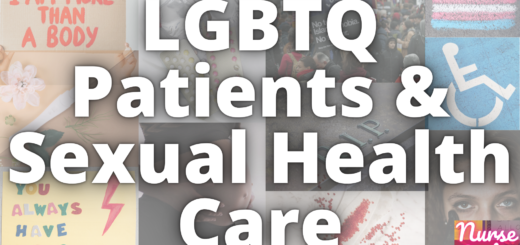Men’s Health Month 2022: My Take on Top Health Concerns

Happy (almost) summer! June is Men’s Health Month, and June 13-19 is Men’s Health week. You might be thinking, wait, isn’t Sadia a women’s health nurse?? So, why is she writing about men’s health?
Welcome to my blog! I’m Sadia, a women’s health nurse practitioner, women’s health content writer, and social commentator. I do many things, but mostly, I write and speak my mind. All views my own unless stated otherwise. Grab something to drink and scroll away with me. It’ll be good for both of us, promise.
Yup, you’re right. I’m a women’s health nurse practitioner. But, I’m also a public health professional and advocate for all things health related. When I first heard of the term men’s health month, I really didn’t know what to think. I knew most health research and education efforts focused on men, so why do they need their own month for health needs?
I did some research on my own and also looked at how men live their daily lives. After spending time online, talking to some friends, and reflecting on men I’ve interacted with, I noticed some things. This week, I’m going to discuss some top men’s health concerns!

#1 Mental Health
Unless you’ve been living under a rock for the past few years, COVID has influenced your life in some way. Your mental health is no exception. Whether your relationships changed, your work conditions altered, or something similar, this pandemic has taken a serious toll on everyone. In particular, mental health concerns and public presence exploded over the past year.
Several mental health telehealth companies emerged. Many therapists and counselors report longer than usual wait times because of the increased demand for their services. Recreational drug and alcohol use increased globally. In addition, people report feeling fatigue at much higher rates.
Even before COVID, men were more likely to commit suicide than women. COVID just made things worse. First, men have historically sought mental health services and counseling at lower rates than women. Next, social norms often dictate that men are strong and do not need to talk about their feelings or show emotions.
This has left many men emotionally shut down, burnt out, and mentally exhausted. Add a pandemic to this, and mental health becomes an extremely big mess. This men’s health month, I want you to genuinely ask yourself how you are feeling? No, really, how are you feeling? Have you ever considered talking about your emotions with a trained professional? Does your employer offer mental health services? What are some things you can do to work on your mental health?
Make a list, be realistic, and set expectations to work on your health for yourself.

#2 Sexual health
As with mental health, sexual and reproductive health is a major health concern. I remember walking past groups of guys or overhearing guys in public talking about how they never wear a condom or get tested since “men don’t get diseases.” Or the homophobic “only gay men get STDs.”
Again, social norms really hurt men regarding their sexual and reproductive health needs. First, if you’re having sex, regardless of your sexuality, you are at risk for sexually transmitted infections (STIs). Second, you cannot simply look at someone and know if that person has an STI. The most common STI symptom is no symptom. Often times, we are taught to approach sexual health in very stigmatized ways.
So, ask yourself. When was the last time you had sex? When was the last time you were tested for STIs? How often do you use a condom when you have sex? Do you even know how to put on a condom correctly?
STI rates are soaring over the past year, mostly because people were not having sex and now back to having sex. And also people were not getting tested when COVID first hit. Taking care of your sexual health is essential to overall men’s health.
If you’re having sex, your task is to find a local STI testing center in your area. Tip: you can also request STI testing at your primary care provider!

# 3 COVID-19 and other respiratory infections
Ah, COVID. The debates, the controversies, the science. From masks to vaccines to travel restrictions, living in a COVID world is truly an adventure. Regardless of your thoughts on COVID, it is a respiratory infection that can cause long-term damage.
Masks can also help prevent the spread of respiratory infections. Vaccines can help prevent death from COVID. And at-home COVID tests are great for those who cannot find in-person testing sites or who do not want to leave their home.
The truth is that we are living in a COVID world. In order to avoid death and long-term complications from COVID, you need to be aware of risk mitigation strategies. COVID has killed over a million people in America and continues to do so, especially among the unvaccinated population.
Other respiratory infections, such as pneumonia and influenza, have vaccines as well. Especially if you have any underlying conditions, such as asthma, cancer, or diabetes, consider staying up to date with your vaccines and wearing a mask.
Answer these questions. Have you thought about getting the COVID-19 vaccine? Do you regularly wear a mask? Do you have any at-home rapid or PCR COVID tests? (USPS is giving free at-home COVID tests!) How often do you wash your hands?
P.S. Are you still reading? If you are able to afford to do so, consider compensating me for my time and labor with a one-time amount via PayPal (https://paypal.me/nursesadia) or Ko-fi (https://ko-fi.com/nursesadia). Thank you!
Men’s Health Moving Forward
These are just three general health topics that affect men. I chose these three topics based on the trends in my world. Also, I know there are several other issues to consider, such as prostate health, fitness, and oral health. I would highly recommend reading up on other men’s health issues and take time for yourself.
Like I said, often times, men are taught to disregard their health needs until it is too late. The best type of health is preventive health. Being prepared and knowledgeable can make you more aware, more confident, and more secure in your health.
What are some trends or topics in men’s health you’d like to see more awareness of?
Until next week!
Yours Truly,
Nurse Sadia

References
https://menshealthmonth.org
https://fortune.com/2021/03/09/womens-health-research-fda-trials/
https://www.mayoclinic.org/diseases-conditions/coronavirus/in-depth/mental-health-covid-19/art-20482731
https://www.kff.org/coronavirus-covid-19/issue-brief/telehealth-has-played-an-outsized-role-meeting-mental-health-needs-during-the-covid-19-pandemic/
https://www.ncbi.nlm.nih.gov/pmc/articles/PMC7763183/
https://www.verywellmind.com/cdc-suicide-death-data-5209227
https://www.healthline.com/health/our-top-10-online-therapy-picks
https://www.cdc.gov/media/releases/2022/p0412-STD-Increase.html
https://www.mayoclinic.org/diseases-conditions/coronavirus/in-depth/coronavirus-long-term-effects/art-20490351
https://www.cdc.gov/mmwr/volumes/71/wr/mm7106e1.htm
DISCLAIMER: Nurse Sadia is a licensed and board-certified women’s health nurse practitioner and registered nurse. All information on this page and on www.digitalhealthcommunicator.com is for educational and informative purposes only. It is not meant to be used for self-diagnosing or self-treatment of any health-related conditions. While the information presented has used evidence-based research and guidelines for accuracy, Nurse Sadia cannot guarantee any inaccuracies as healthcare is rapidly evolving.
This information should not be used to substitute professional medical advice. Nurse Sadia is not responsible or liable for any damages, loss, injury, or any negative outcomes suffered as a result of personal reliance on the information contained on this website. Nurse Sadia also makes no guaranteed positive outcomes. Information is also subject to change as needed without notice. Please consult with your healthcare provider before making any healthcare decisions and ask about guidance for specific health conditions. Please do not disregard the advice of your healthcare provider or delay seeking care for health care conditions.





You must be logged in to post a comment.